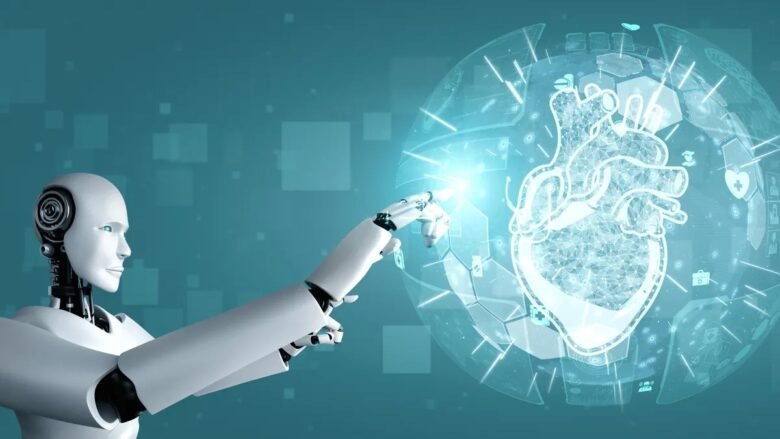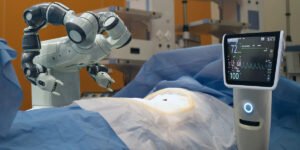Heart health is an important part of overall health, and with the addition of artificial intelligence (AI), heart care is entering a new era. Artificial intelligence is a game changer in cardiovascular health. It can detect heart disease early and create a personalized treatment plan. Artificial intelligence is transforming cardiac care, and this article describes its uses, benefits, and bright future for those who want proactive and personalized cardiovascular management.
The Costs of Cardiovascular Disease Around the World
- Risks and consequences: Cardiovascular disease (CVD) is a leading cause of illness and death for people around the world. Heart disease, stroke, and other diseases affect millions of people every year, significantly increasing the global burden of disease.
- There are problems with the consistent way of doing things: Traditional approaches to heart health make it difficult to identify problems early, find out how dangerous they are, and ensure that treatment is right for each patient. Artificial intelligence is proving to be a powerful partner in helping us overcome these challenges and change the way cardiac care is delivered.
Application of Artificial Intelligence in Early Diagnosis and Detection
- Predictive Analytics: Artificial intelligence uses predictive analytics to calculate the likelihood of developing heart disease. AI programs can find risk groups by looking at large amounts of different types of data, such as medical history, lifestyle factors, and genetic predispositions. This allows assistance to begin immediately.
- Enhancement of medical images: In the field of medical imaging, artificial intelligence makes cardiovascular imaging research more understandable. Smart algorithms can detect small problems in medical images ranging from angiograms to echocardiograms. This helps doctors make a correct and quick diagnosis.
- Complete monitoring: Wearable devices with artificial intelligence can monitor your heart health. People and doctors can use these gadgets to monitor heart health by observing vital signs, identifying problems, and providing real-time information.
Personal Treatment Plan
- Pharmacogenomics and drug management: Artificial intelligence simplifies pharmacogenomic analysis so that heart disease medications can be optimally managed. By looking at a person’s genes, a computer can guess how they will respond to drugs, making treatments more effective and reducing side effects.
- Make the most of interventional surgery: Artificial intelligence improves care plans for people needing interventional procedures. From coronary intervention to pacemaker placement, smart algorithms help plan surgical procedures to ensure they are performed correctly and achieve better results.
- Lifestyle and behavior changes: The AI-powered app helps people change their lifestyle and improve heart health. These apps view information about users, make personalized recommendations, and provide real-time feedback. This encourages healthy habits and helps with prevention.
How AI Can Improve Cardiovascular Health in Real-Life?
- Telemedicine and Remote Monitoring: Artificial intelligence makes telemedicine and remote monitoring of cardiovascular disease patients easier. Remote devices equipped with artificial intelligence can view patient data, identify problems, and enable virtual consultations, allowing care to continue outside traditional healthcare spaces.
- Intelligent diagnosis and testing at home: Smart diagnostics, powered by artificial intelligence, make heart testing at home possible. People can easily monitor their health and keep an eye on things with the help of devices that measure blood pressure, ECG readings, and other related statistics.
- Group people by risk and focus on specific interventions: AI’s ability to classify risks could enable tailored interventions. By finding people at high risk, healthcare professionals can take preventative measures, such as changing their medications, changing their lifestyle, and keeping an eye on them to make sure nothing bad happens.
Problems to be Solved and Ethical Issues to be Considered
- Integration and interoperability: AI must be interoperable to work well with current healthcare systems. For AI applications to have the greatest impact, they must work well with electronic health data and other technologies.
- How to use patient data ethically: When AI is used for cardiovascular health, patient data must be properly taken into account. To ensure that people can trust AI applications, it is important to strike a balance between using data to improve care and protecting patient privacy.
- Fair access to artificial intelligence technology: Everyone must have equal access to AI tools. Access to advanced healthcare options should not be unequal, and efforts should be made to ensure that the benefits of AI for cardiovascular health reach all groups.
How Cardiovascular Health Will Change in the Future?
- Cardiovascular Comprehensive Artificial Intelligence Clinic: A cardiovascular comprehensive artificial intelligence clinic may be established in the future. These clinics can use artificial intelligence for predictive analytics, continuous monitoring, and personalized treatment planning, allowing them to provide comprehensive, proactive cardiac care for everyone.
- How AI can help surgeries get better: Artificial intelligence will play an important role in improving surgeries for heart problems. From robot-assisted surgery to precision interventions guided by artificial intelligence, the combination of technology and surgical skills has the potential to lead to better patient outcomes.
- Global Joint Research Initiatives: Global joint research initiatives can further improve the use of artificial intelligence in heart health. Sharing ideas, information, and the best ways of doing things can accelerate the creation of new solutions and ensure the benefits of AI reach a wider range of people.
Conclusion
Artificial intelligence is changing the way heart health is managed. In the future, heart health will be based on early detection, personalized intervention, and continuous tracking. Technology is constantly changing, and people, healthcare professionals, and experts are at the forefront of a revolution that could change the way we treat heart disease. There are still questions and ethical issues to consider, but the potential of artificial intelligence in cardiovascular health gives us hope for a future where proactive and personalized approaches will become the rule, leading to healthier hearts and better Results.
FAQs
1. What role does AI play in the early detection of cardiovascular problems?
Artificial intelligence helps in early diagnosis by using predictive analytics and looking at large and diverse data sets to determine a person’s likelihood of developing cardiovascular disease. This proactive approach ensures that people are involved at the right time to improve results.
2. How can artificial intelligence make cardiac imaging research more understandable?
Imaging studies can be better understood with the help of artificial intelligence, which can spot small problems in heart images such as angiograms and echocardiograms. This feature helps doctors make an accurate assessment and propose the best treatment plan.
3. How can artificial intelligence develop more specific heart care plans for each person?
Artificial intelligence tailors treatment plans by streamlining pharmacogenomic analyses and guessing how people will respond to medications based on their unique genetic information. This personalized approach improves the effectiveness of the treatment while reducing the risk of side effects.
4. Can AI applications help with remote monitoring of cardiovascular disease patients?
Yes, AI applications enable remote monitoring of heart patients. Artificial intelligence devices can view patient data, detect abnormalities, and set up virtual consultations so patients can receive care even when they are not in a regular medical setting.
5. What ethical issues should be considered when using artificial intelligence to improve heart health?



